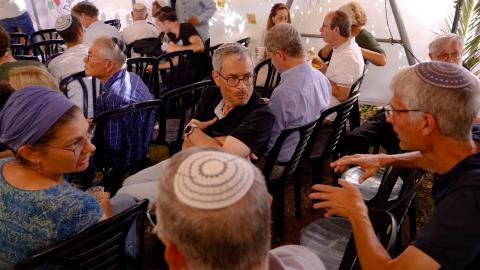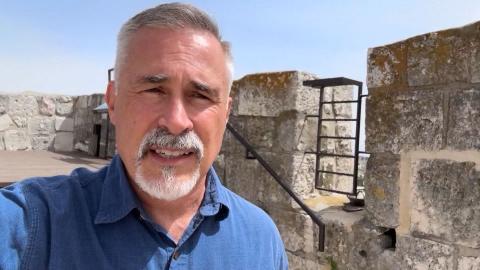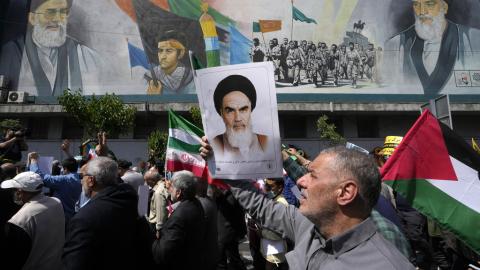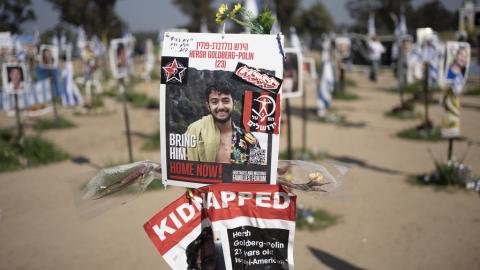
In West Bank Town of Efrat, Israelis and Palestinians Attend 'Peace Sukkah'
JERUSALEM, Israel – For the past few weeks, clashes between Israelis and Palestinians have been on the increase. Despite the tension, CBN News learned of one event designed to reconcile these children of Abraham.
The city of Efrat is a Jewish community just a few miles outside Jerusalem. It’s in the biblical land of Judea, also known as the West Bank, and is surrounded by many Arab villages.
This year, during the Feast of Tabernacles (Sukkot), Oded Revivi, Efrat’s mayor, hosted a unique gathering at his home. The event was called the Sukkah of Peace, part of his efforts to be a good neighbor and promote peaceful coexistence in the tumultuous West Bank.
Surprisingly, some of the guests include his Palestinian neighbors who have made it their custom to come each year. Mayor Revivi says they’re sending a message “that despite what you might be hearing on the media about what’s going on around, there are also people that can manage together, have a socialized discussion.”
Another guest joining this year’s peace sukkah was Israeli Defense Minister Benny Gantz. When asked what his message was for the gathering, Gantz replied, “I think we have to stay as connected as possible because being aware of one another is the beginning of caring for one another.”
Revivi believes the media often distorts the reality on the ground in his part of Israel.
“We see way too often and, definitely, also in social media, how you hear about the extremist causing riots, causing violence, causing fear, and people tend to think that that is the norm. That's the majority of the people. That's what's happening everywhere all the time”, Revivi said. He added, “And our realization living here is that is not the reality.”
Part of that reality is the work of a physician, Dr. Yitzchak Glick, a 30-year Efrat resident. He provides medical treatment for Palestinians in the area, and sometimes even goes to their homes.
“I like going to their homes because I learn a lot about their culture and I give them the home field advantage, and I think that’s what makes them feel comfortable,” Glick explained.
He considers the relationship with his Arab neighbors a largely untold story.
“There's a lot, thousands of thousands of daily positive interactions that don't get coverage, and, you know, get coverage when stones fly, and bullets fly,” he said, referring to the incidents of violence that get most of the attention. But the many positive interactions are often ignored.
“Both parties are here to stay, and we need, we need to find a way to live together with mutual respect,” Glick said.
The tenuous situation in Efrat is another reality, which is why many Palestinian guests at the sukkah asked not to be in the range of television cameras. Mayor Revivi explained the reason in his invitation letter.
He recalled that “Eight yars ago, we first hosted our Muslim neighbors from the surrounding villages at the sukkah in our home … The event was touching and fascinating for all those involved. Unfortunately, the Palestinian Authority saw the meeting as ‘problematic.’ They summoned four of our Palestinian guests for an interrogation that lasted four and a half days.”
One Palestinian did agree to an interview. Despite the potential danger, Ashraf Jabari from Hebron has attended six of the sukkah gatherings. He is a co-founder of the Judea and Samaria Chamber of Commerce.
“I’ve been involved in this (reconciliation) work for the past 15 years,” Jabari said. “We remain consistent and undeterred and we continue to move forward in this work unafraid. I hope that we’ll get to peace. This is our objective to have a real peace with the Israelis. There’s no other way other than living together,” he added.
Jabari says the Palestinian Authority is not pursuing peace. “It’s because of the Palestinian Authority that doesn’t support or condone this type of program. But those who are brave will attend and do attend.” He continued, “I call to the world for those that truly want to move forward in peace—not to work with those who are corrupt and those who are robbing the public funds for the people who want to work together, hand in hand.”
Mayor Revivi admires neighbors like Jabari. “It is surprising how brave they are. They don't enjoy freedom of speech. They don't enjoy free media, that they can actually say whatever they want to, to whomever they want, where they want, and the fact that they're coming, the fact that they're engaging, the fact that they're willing – some of them to be exposed – that is definitely something which is revolutionary to some of the people,” he said.
Revivi believes this grassroots approach is the way forward.
“I think there's no other way but to get to know your neighbors, to discuss with them what's bothering them, to understand what their needs are, and from there to try and find solutions.”
***Please sign up for CBN Newsletters and download the CBN News app to ensure you keep receiving the latest news from a distinctly Christian perspective.***
Did you kno





